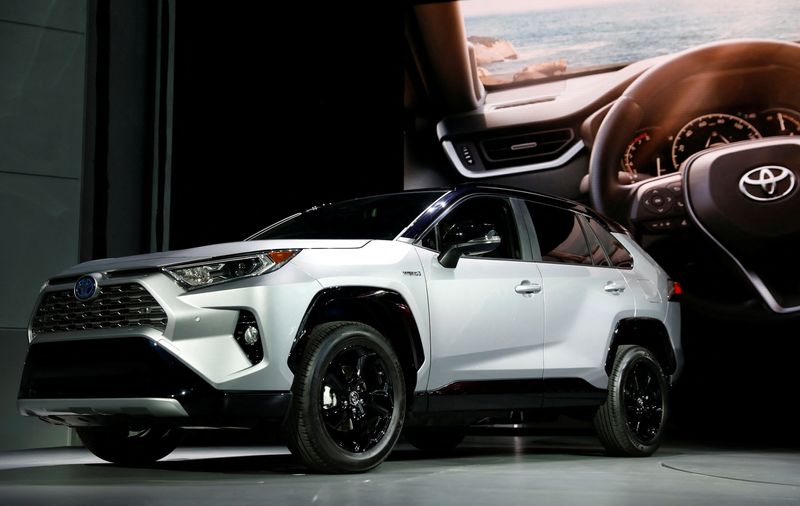Exclusive-Toyota weighs adding US production of new RAV4 in response to tariffs, sources say

By Maki Shiraki
TOKYO (Reuters) – Toyota is considering producing the next version of its top-selling RAV4 SUV in the United States, three people familiar with the matter said, becoming the latest automaker to rethink supply chains to lessen the hit from U.S. tariffs on imported vehicles.
Toyota makes the current version of the popular SUV in Kentucky, Canada and Japan. It originally planned to export the new RAV4 to the United States from Canada and Japan but it is now considering producing it in Kentucky as well, according to the people, all of whom declined to be identified because the information is not public.
Adding supply from the United States would lessen the impact for the Japanese automaker from President Donald Trump’s 25% tariffs on imported cars and avoid potentially higher costs in cases of fluctuations in the volatile yen currency, two of the people said.
Toyota is set to unveil an overhauled 2026 RAV4 – its first redesign since the fifth-generation 2019 model – later this year and will then gradually introduce it in different markets around the world, one of the people said. It has yet to announce the exact timing of the U.S. roll-out.
Toyota has yet to finalise its production plans, the people said. Any production changes cannot be implemented quickly and require long-term planning, one of them said, due to the time-consuming and capital-intensive work involved in retooling manufacturing facilities and adjusting supply chains.
If the automaker goes ahead with the Kentucky plan, it would likely start production there in 2027, one of the people said. Regardless of the outcome with Kentucky, Toyota’s overall vehicle output in Canada is likely to be maintained, the people said.
Toyota said in a statement to Reuters that it continually studied ways to improve its manufacturing to best serve customers and provide stable employment for employees.
“We have nothing to announce at this time and will not comment on speculation,” it said when asked about plans to produce the new version of the RAV4 in Kentucky.
The RAV4 was the best-selling vehicle in the U.S. last year, knocking Ford’s F-150 pickup truck off the top spot it held for years, according to market research firm JATO Dynamics. The Japanese automaker sold more than 475,000 RAV4s in the U.S. last year, accounting for a fifth of its total vehicle sales there.
It was not immediately clear how many of the new RAV4 Toyota would produce in the United States. It has 11 plants in the U.S., including auto-parts plants, and produced almost 1.3 million vehicles there in 2024, equivalent to more than half of its 2.3 million U.S. car sales.
Toyota said this month it will continue to run its operations as normal and focus on bringing down fixed costs, stopping short of taking more drastic steps such as raising vehicle prices in response to the tariffs.
Global automakers, including U.S.-based ones that produce cars in other countries, face the spectre of potentially higher costs from the 25% levy on imported cars introduced this month.
Nissan plans to reduce Japanese production of its top-selling U.S. model by 13,000 vehicles over the three months to July, Reuters reported on Tuesday.
Honda plans to make its next-generation Civic hybrid in the U.S. state of Indiana rather than in Mexico to avoid potential tariffs, Reuters has reported.
Trump said on Monday he was considering modifying the auto levy because automakers “need a little bit of time”.
Japanese automakers have been building up U.S. production for decades. Toyota says its total investment in the U.S. over the years has reached almost $50 billion.
Tokyo’s top trade negotiator, Ryosei Akazawa, met with Trump and U.S. officials in Washington to discuss tariffs on Wednesday. Trump said there was “big progress” in the talks, after he made the surprise move to negotiate directly with the Japanese trade delegation.
(Reporting by Maki Shiraki; Writing by Daniel Leussink; Editing by David Dolan and Jamie Freed)









